Edwin Brady - Type-driven Development with Idris
Here you can read online Edwin Brady - Type-driven Development with Idris full text of the book (entire story) in english for free. Download pdf and epub, get meaning, cover and reviews about this ebook. year: 2017, publisher: Manning Publications, genre: Home and family. Description of the work, (preface) as well as reviews are available. Best literature library LitArk.com created for fans of good reading and offers a wide selection of genres:
Romance novel
Science fiction
Adventure
Detective
Science
History
Home and family
Prose
Art
Politics
Computer
Non-fiction
Religion
Business
Children
Humor
Choose a favorite category and find really read worthwhile books. Enjoy immersion in the world of imagination, feel the emotions of the characters or learn something new for yourself, make an fascinating discovery.
- Book:Type-driven Development with Idris
- Author:
- Publisher:Manning Publications
- Genre:
- Year:2017
- Rating:5 / 5
- Favourites:Add to favourites
- Your mark:
Type-driven Development with Idris: summary, description and annotation
We offer to read an annotation, description, summary or preface (depends on what the author of the book "Type-driven Development with Idris" wrote himself). If you haven't found the necessary information about the book — write in the comments, we will try to find it.
Summary
Type-Driven Development with Idris, written by the creator of Idris, teaches you how to improve the performance and accuracy of your programs by taking advantage of a state-of-the-art type system. This book teaches you with Idris, a language designed to support type-driven development.
Purchase of the print book includes a free eBook in PDF, Kindle, and ePub formats from Manning Publications.
About the Technology
Stop fighting type errors! Type-driven development is an approach to coding that embraces types as the foundation of your code - essentially as built-in documentation your compiler can use to check data relationships and other assumptions. With this approach, you can define specifications early in development and write code thats easy to maintain, test, and extend. Idris is a Haskell-like language with first-class, dependent types thats perfect for learning type-driven programming techniques you can apply in any codebase.
About the Book
Type-Driven Development with Idris teaches you how to improve the performance and accuracy of your code by taking advantage of a state-of-the-art type system. In this book, youll learn type-driven development of real-world software, as well as how to handle side effects, interaction, state, and concurrency. By the end, youll be able to develop robust and verified software in Idris and apply type-driven development methods to other languages.
Whats Inside
- Understanding dependent types
- Types as first-class language constructs
- Types as a guide to program construction
- Expressing relationships between data
About the Reader
Written for programmers with knowledge of functional programming concepts.
About the Author
Edwin Brady leads the design and implementation of the Idris language.
Table of Contents
- PART 1 - INTRODUCTION
- Overview
- Getting started with IdrisPART 2 - CORE IDRIS
- Interactive development with types
- User-defined data types
- Interactive programs: input and output processing
- Programming with first-class types
- Interfaces: using constrained generic types
- Equality: expressing relationships between data
- Predicates: expressing assumptions and contracts in types
- Views: extending pattern matching PART 3 - IDRIS AND THE REAL WORLD
- Streams and processes: working with infinite data
- Writing programs with state
- State machines: verifying protocols in types
- Dependent state machines: handling feedback and errors
- Type-safe concurrent programming
Edwin Brady: author's other books
Who wrote Type-driven Development with Idris? Find out the surname, the name of the author of the book and a list of all author's works by series.

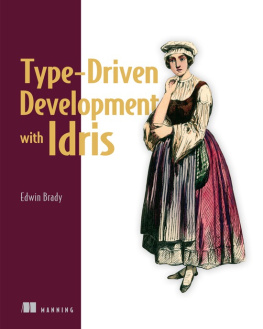


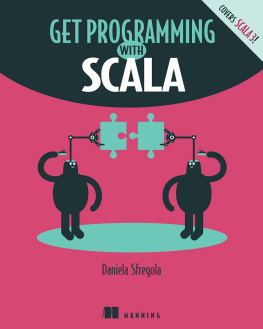

![Percival - Test-driven web development with Python: [obey the testing goat: using Django, Selenium, and JavaScript]](/uploads/posts/book/248536/thumbs/percival-test-driven-web-development-with-python.jpg)


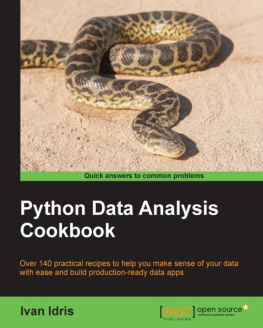
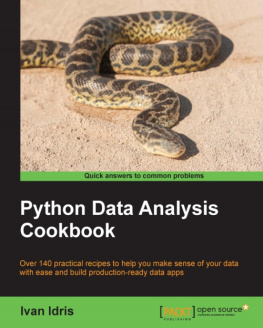
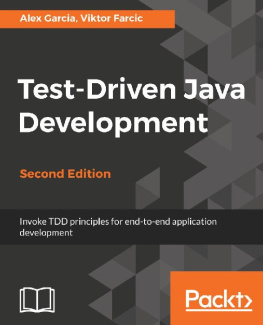
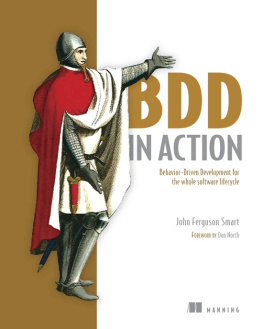
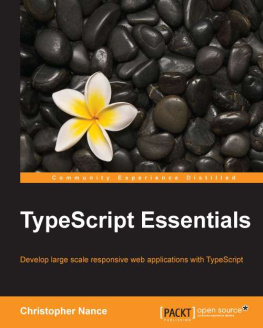

 Recognizing the importance of preserving what has been written, it is Mannings policy to have the books we publish printed on acid-free paper, and we exert our best efforts to that end. Recognizing also our responsibility to conserve the resources of our planet, Manning books are printed on paper that is at least 15 percent recycled and processed without the use of elemental chlorine.
Recognizing the importance of preserving what has been written, it is Mannings policy to have the books we publish printed on acid-free paper, and we exert our best efforts to that end. Recognizing also our responsibility to conserve the resources of our planet, Manning books are printed on paper that is at least 15 percent recycled and processed without the use of elemental chlorine.